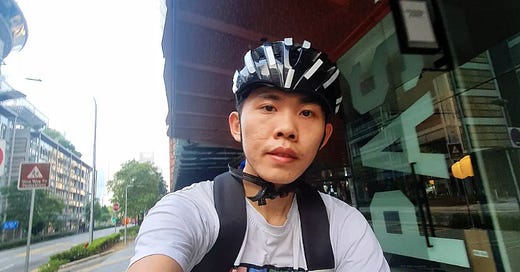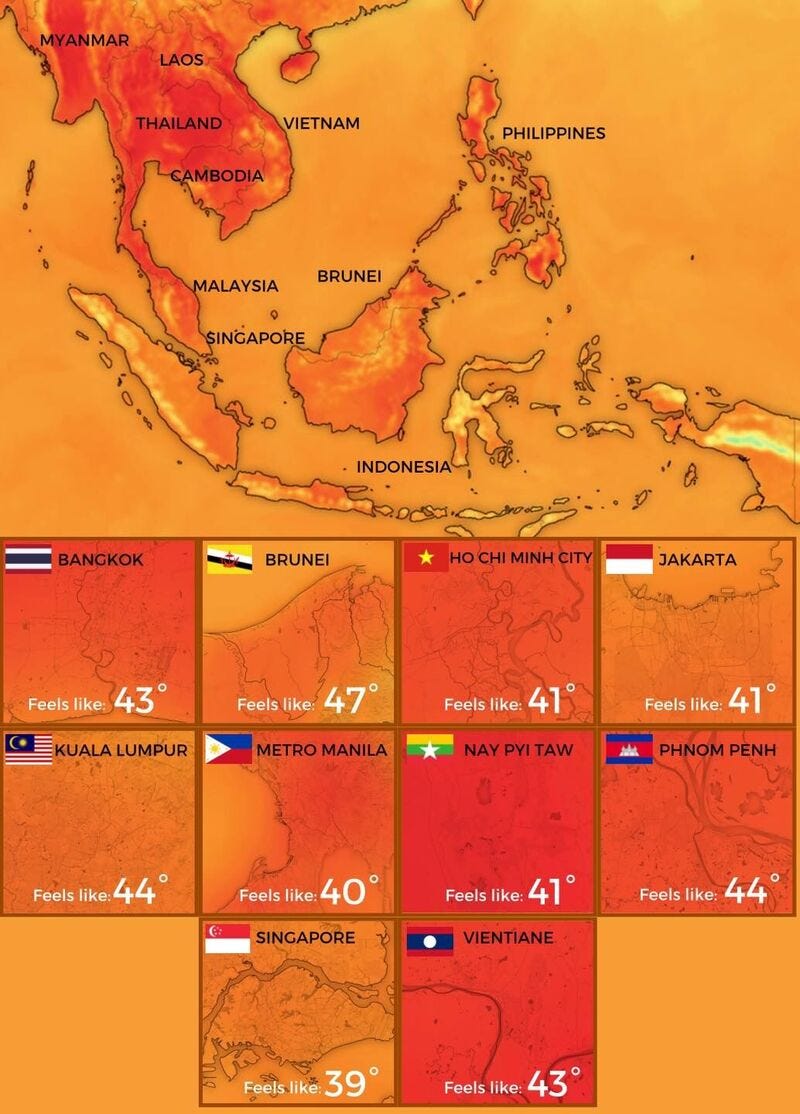#13: Taking risks and betting on people
Jeshua's business foray into Myanmar, and his journey to becoming an accidental advocate.
Welcome to this week’s edition of SEAmplified! Your latest insights on Southeast Asian youth and youth politics in 9.75 minutes.
⌛This week in brief:
📌 This Singaporean accidentally found success - and a life mission - in Myanmar.
📌 This week, Seamplified: 23rd April 2024 🔥Trailblazers
Trailblazers features youths who are steering today’s Southeast Asia towards a better tomorrow.This Singaporean millennial found success - and a life mission - in Myanmar.
Jeshua Soh is an entrepreneur, filmmaker, investor and traveler - and soon, long-distance adventure cyclist.
On April 28, 2024, he’ll embark on a two-week, 2000+ kilometer cycling challenge from Singapore to Bangkok, to raise S$100,000 for a clinic along the Thai-Myanmar border. The funds will aid nearly 100,000 refugees fleeing across the Thai-Myanmar border amid a resurgence in violence.
What drives Jeshua’s affection for Myanmar? A quick search online and past media features would reveal that apart from being involved with Myanmar for the past five years, his personal life may be unconventional to any Singaporean.
He dropped out of high school to pursue his interest in the media industry, founded four companies, ventured into venture capital (VC) and investing, and embarked on a “crazy adventure” to more than 55 countries during the height of the Covid-19 pandemic.
Read on to find out how his experiences revealed some of the traits that have shaped his unique life trajectory, before becoming an “accidental” advocate for Myanmar.
All images courtesy of Jeshua Soh.
Taking calculated risks
Jeshua started his entrepreneurship journey by solving the problems that he was facing.
In 2015, Jeshua realized that he had a lot of spare camera equipment that he wanted to rent out. He also met people who had the same problem, and he decided to start J Rental Centre, a platform for anyone to store their camera equipment for rent in one place.
While Jeshua had a diploma in film, sound, and video, he did not come from a business background nor did he know how to run a company or tech startup. He then decided to pivot the business from shooting corporate and wedding videos to helping startups with their storytelling and video production to learn from the founders and their mentors.
But retaining talent became a perennial struggle as his business grew. It offered neither the stability of a public sector job, nor the allure of Big Tech companies or venture-backed startups.
As he hired more people and learned about the programs that were available to support entrepreneurs, he began to struggle with retaining talent.
“People would only decide to stay in a small company for only a few months before embarking on their next job or postgraduate program,” observed Jeshua.
Hiring freelancers was also no easy feat, as they picked projects based on their interests or perceived learning value, which resulted in high turnover rates for the company. Jeshua then realized that he had to hire full-time employees from overseas. He looked to Myanmar, a country that he first visited in 2013 while on a school trip.
“The country was in a time capsule because they were under military rule for 50 years, which preserved a certain aspect of the culture,” Jeshua recalled. To him, Myanmar possessed an unparalleled community spirit, and people were generally more supportive of each other.
As Myanmar transitioned into a civilian government over the next few years, Jeshua witnessed significant changes and rapid advancements in the country’s development in his subsequent trips and made connections with local companies along the way. In 2018, Jeshua founded Crossworks Myanmar to hire full-time employees from Myanmar, while helping local companies to manage their hires.
To his surprise, there were more than 100 applicants when he posted his first job post onto a jobs portal. He later learnt that many local youths who graduated abroad were underemployed in local companies, and they craved new learning opportunities.
“They knew that they were far behind, and they were genuinely interested in being a sponge and absorbing as much as they could from foreign employers,” said Jeshua, as he found that the opportunity to work with a foreign company was a novelty amongst the Burmese.
Betting on Myanmar was a risky move. But to Jeshua, risk is like data. “People can de-risk by learning and doing more research, [and] not just [assuming that] something is the riskiest move,” he added.
A rebel since young
But not everyone has an appetite for risk.
Jeshua was never one for playing it safe: he ditched the conventional education path to pursue his deep interest in media, ran freelance media projects as a high school student, and grew his business deep into Myanmar.
It was not the case that there was nothing to lose. Jeshua said, “Sometimes you just gotta take a bit of risk, right? There were a lot of things to lose, let’s say if I didn’t manage to complete the media course, I’d be left with only a primary school certificate, and I would have little opportunity to return to high school afterwards. It would be a situation of burning your own boats.”
Many years later, when Jeshua began to work with the Burmese, he found himself wanting to challenge the dominant narrative portrayed in mainstream media after the 2021 coup–that leaving Myanmar and relocating overseas was the best option for people who wanted a better life.
“We have to balance the narrative, because there is alot of one-sided news floating around,” remarked Jeshua.
He realized that familial pressure and cases of emotional distress and financial stress caused by relocation are not discussed on social media. He elaborated by providing an analogy, “If you think that life is going to be tough where you are currently at, moving to another country might not solve the root problem but give you a hundred percent chance of a tougher life in the short run, right?”
Having defied conventional paths and dominant narratives, Jeshua was able to explore and seize new opportunities for himself by being open-minded.
Having an open mind
When Covid-19 hit, Jeshua found himself stranded overseas while working with a VC fund, as there were many restrictions in place for him to return to Singapore. Instead of waiting for the pandemic to end, he decided to extend his trips, which culminated into a four year long trip across 55 countries which broadened his knowledge and perspectives on the startup and VC ecosystems in key destinations like Estonia, Israel, and the United States.
The opportunity to travel allowed him to gain a broader understanding of how people in developing and developed markets have very different tastes and preferences. That helped him to understand how people deploy and adapt to technology, and look beyond what most investors are looking at in Southeast Asia–the more prominent markets of Singapore and Indonesia.
Jeshua is acutely aware that his experience did not mean that he has a full understanding of any economy or culture. To him, it is more important to balance between having some knowledge of what is happening in other countries and understanding that it was anecdotal, rather than thinking that the knowledge reflects the actual situation on the ground completely.
With that in mind, Jeshua feels that it is important to consistently talk about issues that are at the top of people’s minds, which people care about, while not eliminating the fact that problems still exist even if people don’t talk about it.
And this is why Jeshua has gone from “solving his own problem” to an “accidental” advocate for Myanmar, and now more specifically to raise an awareness on a refugee crisis at the Thai-Myanmar border through his cycling challenge.
To him, raising funds is just the tip of the iceberg - drawing our attention to a longstanding issue is the prize. The suffering in Myanmar had long been eclipsed by other conflicts in the Middle East and Ukraine, and Jeshua wants the world to remember the people they had neglected.
But Jeshua’s story didn’t draw our attention to just Myanmar. His story of unconventional success and going against the grain also illuminates many paths less taken, and how youths could define their own pursuit of happiness.
“What I'm doing is basically to layer on top of [key issues close to him], like an additional reason for people to start talking about these things,” Jeshua remarked. “An additional [incentive], if you will.”
Know a Southeast Asian youth who’s working, studying, or living in another Southeast Asian country, or are you doing so and would like to share your story? Email the editors at tanzhantiam@gmail.com or tianwen.tay@seakoel.com
If you enjoyed today’s article, follow SEAmplified on Instagram and LinkedIn, hit the subscribe button below, or email the editors if you have any feedback for us!
🌏This week, SEAmplified
This week, SEAmplified is our weekly roundup of the latest youth-targeted community developments, insights, and news from across Southeast Asia. News roundup
Malaysians are increasingly concerned that the country’s leadership is bungling the country’s declining corruption and living standards. The percentage of Malaysians pessimistic about their country’s direction has climbed from less than 30% in January 2023 to 47% in March this year.
Singapore’s foreign minister Vivian Balakrishnan has expressed the city-state’s interest in accelerating the competitiveness of Filipino companies, particularly in sectors such as artificial intelligence and renewables. The minister also gave a nod to Philippine youth, praising them as “hungry and willing to learn.”
Philippine universities in Cagayan province have defended the presence of mainland Chinese students on their campuses after local lawmakers alleged that the students could pose a security risk. The institutions also denounced remarks made by the lawmakers as Sinophobic and blatantly racist.
Thailand is stepping up its efforts to protect civilians along the Thai-Myanmar border. The Myanmar junta is fighting with an ethnic armed group in the border town of Myawaddy, which forced more than 1,686 Burmese to cross the border into Thailand’s Mae Sot to seek temporary refuge from the fighting.
Vietnam is planning to cut down a swathe of “protective forests” in Ba Ria - Vung Tau province as part of plans to expand the country’s 994 coastal road. Official bylines herald a boom in tourist dollars, but traffic along this coastal road remains sparse; the affected areas could be left vulnerable to erosion and sea encroachment.
SEA Visualized
It’s tough keeping your cool these days, especially in Southeast Asia. Scorching heat has forced in-person class suspensions in the Philippines and decimated coral in Thailand, and the rising mercury is still not showing any signs of restraint.
As researcher and independent consultant Bridget Welsh notes, temperatures recorded across Southeast Asia this year have, quite literally, been off the charts. But is Southeast Asia doing enough to climate-proof its future? Welsh has more in her chat with Danny Marks of Dublin City University on her podcast here.
Community highlights
Social media is the new search, but that growing dependence on platforms like Instagram and TikTok could have serious effects on Southeast Asia’s political landscape. Case in point: Indonesia’s recent presidential elections. How did social media tip the scales then? Our friends at ISEAS has more on this in their upcoming webinar.
Online censorship is alive and well in Southeast Asia. But to what other lengths will governments in the region go to stifle dissent? A multi-year study recently published by the Manushya Foundation (in collaboration with many regional nonprofits) has more.











